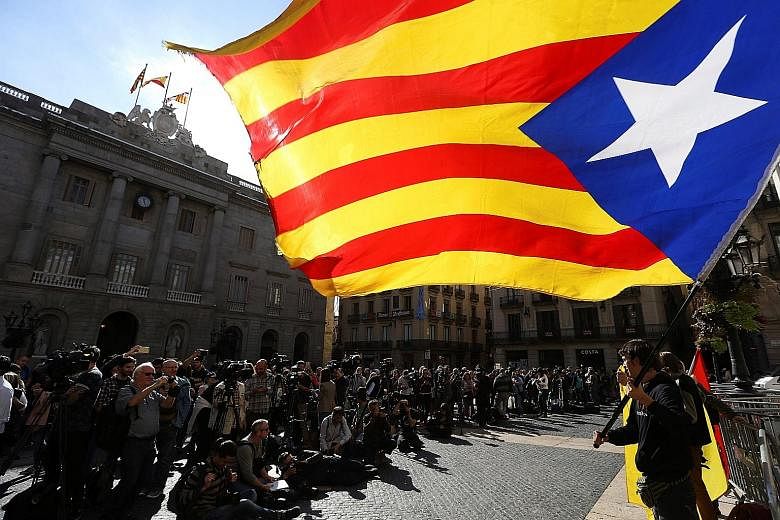BARCELONA • Spanish prosecutors yesterday demanded that Catalonia's dismissed leaders be charged with rebellion after the regional Parliament declared independence last week and the central government in Madrid moved to take control of the region.
Upping the ante in the European Union country's biggest political crisis in decades, Spain's chief prosecutor said he was seeking charges including rebellion and sedition against the Catalan leaders, sacked by Madrid last Friday.
Mr Jose Manuel Maza said the officials "caused an institutional crisis that led to the unilateral declaration of independence (by the Catalan parliament) carried out on Oct 27 with total contempt for our Constitution".
Meanwhile, there was so far no sign of Catalonia's dismissed regional president Carles Puigdemont. A Spanish government source told AFP that the 54-year-old was in Brussels.
Rebellion is punishable by up to 30 years in prison. A court now has to decide whether to accept the case against the leaders and bring charges.
On Sunday, Belgium's immigration minister suggested that Mr Puigdemont could receive asylum in Belgium on the grounds that he might not get a fair trial in Spain. Belgian Prime Minister Charles Michel later insisted that was "not on the agenda". Mr Puigdemont on Saturday urged "democratic opposition" to Madrid's effort to take control of his region.
He maintains that the result of an independence referendum on Oct 1 - outlawed by Spain's top court - gave the wealthy north-eastern region a mandate to declare it was seceding from Spain.
All eyes yesterday were on the regional government building in Barcelona - where the Spanish flag was flying - to see whether Mr Puigdemont or members of his former administration would appear.
Catalan police, now under orders from Madrid, have been told they can allow the dismissed leaders to enter the government headquarters in Barcelona, but only to clear their desks.
One member of the dismissed government, Mr Josep Rull, tweeted a photo of himself "at the office" doing his job as a regional minister. Media reports said he left again shortly afterwards.
Late on Friday, the Spanish Senate gave Madrid the power to impose direct rule on Catalonia under Article 155 of the Constitution, the first time this so-called "nuclear option" has been applied. That followed the unilateral declaration of independence by Catalonia's Parliament the same day. Madrid took control of key powers and fresh Catalan elections were called for Dec 21.
A spokesman for Mr Puigdemont's party PDeCAT said yesterday that it would take part in the election. There had been speculation that it might boycott the vote.
The international community, including the EU, struggling with Brexit and other challenges, has largely spurned the independence declaration and has united behind Madrid.
Work resumed normally in Catalonia and calm reigned on the streets yesterday despite calls for civil disobedience from secessionist politicians, in early signs that the direct rule imposed was taking hold.
Although some public-sector workers have yet to tell their new bosses whether they will accept orders, the lack of unrest came as a relief for financial markets, which rose.
The main civic groups behind the pro-independence campaign had called for widespread civil disobedience and said that public-sector workers such as teachers, firefighters and the police should refuse orders from the central authorities.
But most workers started their working day as normal yesterday and there was no sign of widespread absenteeism.
REUTERS, AGENCE FRANCE-PRESSE

